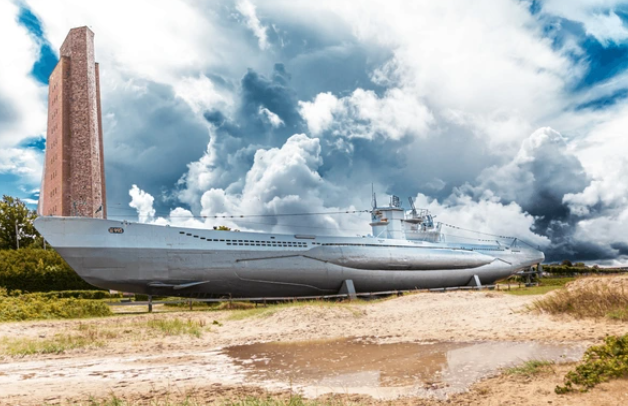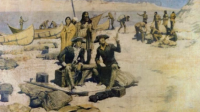Introduction: The Beginning of a Tumultuous Era
The First Schleswig War, fought between 1848 and 1851, was the initial clash over the duchies of Schleswig and Holstein, setting the stage for a series of conflicts that would ultimately reshape the political landscape of northern Europe. This war, often overshadowed by the more decisive Second Schleswig War, was a significant precursor to the later struggles that would culminate in the unification of Germany and the decline of Danish power in the region. The First Schleswig War was not just a military conflict but also a battle over national identity, sovereignty, and the complex relationship between Denmark and the German Confederation.
Read Also : Second Schleswig War (1864): A Turning Point in European Power Dynamics
The Historical Background: Schleswig and Holstein in the 19th Century
The duchies of Schleswig and Holstein had long been at the center of a complex political and cultural struggle between Denmark and the German Confederation. These territories were home to both Danish and German-speaking populations, leading to a long-standing dispute over their allegiance and governance. The situation in Schleswig and Holstein was further complicated by their unique legal status: Schleswig was a Danish fief, while Holstein was part of the German Confederation.
The Roots of the Conflict: Nationalism and Sovereignty
The growing tide of nationalism in the 19th century played a crucial role in the lead-up to the First Schleswig War. Both Denmark and the German Confederation sought to assert their influence over the duchies, each claiming historical and cultural ties to the region. The Danish government aimed to fully integrate Schleswig into the Danish state, while the German Confederation, led by Prussia, sought to protect the rights of the German-speaking population and maintain Holstein’s status within the Confederation.
The rise of German nationalism was particularly influential in the duchies, where the German-speaking population began to demand greater autonomy and closer ties with the German Confederation. This movement was part of the broader wave of nationalism sweeping across Europe in the mid-19th century, as people began to identify more strongly with their linguistic and cultural communities.
In Denmark, the nationalist movement took a different form, with the Danish government pushing for the full integration of Schleswig into the Danish kingdom. This policy, known as the “Eider Policy,” sought to make the River Eider the southern border of Denmark, effectively incorporating Schleswig into the Danish state. The Danish government’s actions were seen as a direct threat by the German Confederation, leading to increased tensions and eventually to war.
The Political Climate in Europe
The First Schleswig War must also be understood within the broader context of European politics in the mid-19th century. This period was marked by significant upheaval and change, as the forces of nationalism, liberalism, and revolution swept across the continent. The 1848 Revolutions, which broke out in several European countries, created a climate of instability and uncertainty, further complicating the situation in Schleswig and Holstein.
The European powers were deeply divided over the Schleswig-Holstein question, with different states taking different positions based on their own national interests. Prussia and other German states supported the German-speaking population in the duchies, while Britain and France were more sympathetic to Denmark’s claims. This division among the European powers made it difficult to find a diplomatic solution to the conflict, ultimately leading to the outbreak of war.
The broader European context also influenced the strategies and goals of the belligerents in the First Schleswig War. For Denmark, the war was an opportunity to assert its sovereignty and national identity in the face of German nationalism. For the German Confederation, the war was part of a larger struggle to unify the German states and assert their independence from foreign influence.
The Role of the Danish Monarchy
The Danish monarchy played a central role in the events leading up to the First Schleswig War. King Christian VIII of Denmark, who reigned from 1839 to 1848, pursued a policy of centralization and sought to strengthen the Danish state’s control over Schleswig. His successor, King Frederick VII, continued this policy, but his more liberal inclinations and the pressure from Danish nationalists led to the escalation of tensions with the German Confederation.
The Danish monarchy’s policies were driven by a combination of nationalist sentiment and the desire to modernize the Danish state. The integration of Schleswig into Denmark was seen as a way to strengthen the kingdom and secure its borders. However, these policies also alienated the German-speaking population in the duchies and provoked a strong reaction from the German Confederation.
The role of the Danish monarchy in the lead-up to the First Schleswig War highlights the complex interplay between nationalism, state-building, and international diplomacy in 19th century Europe. The decisions made by the Danish kings in this period had far-reaching consequences, setting the stage for the conflict that would soon erupt.
The Rise of the German Confederation
The German Confederation, established in 1815 after the Napoleonic Wars, was a loose association of German-speaking states and territories, including Holstein. The Confederation was dominated by Austria and Prussia, two rival powers with their own ambitions for leadership within the German-speaking world. The Schleswig-Holstein question provided an opportunity for these powers to assert their influence and advance their goals.
The rise of the German Confederation was a key factor in the outbreak of the First Schleswig War. The Confederation’s support for the German-speaking population in Schleswig and Holstein was driven by a combination of nationalist sentiment and strategic calculation. For Prussia, in particular, the conflict was seen as an opportunity to expand its influence in northern Germany and to challenge Austria’s dominance within the Confederation.
The German Confederation’s involvement in the First Schleswig War also reflected the broader tensions between the emerging nation-states of Europe and the older, multinational empires. The conflict over Schleswig and Holstein was part of a larger struggle between the forces of nationalism and the traditional, dynastic states that had long dominated European politics.
The Outbreak of War: The Struggle for Schleswig and Holstein
The First Schleswig War began in March 1848, when nationalist uprisings in the duchies of Schleswig and Holstein triggered a broader conflict between Denmark and the German Confederation. The war quickly escalated, with both sides mobilizing their forces and seeking to assert their control over the disputed territories.
The Danish Campaign: Initial Successes and Setbacks
At the outset of the war, Denmark enjoyed several early successes, thanks in part to its well-trained and disciplined army. Danish forces were able to quickly suppress the nationalist uprisings in Schleswig and Holstein and secure control over key strategic positions. However, these initial victories were soon followed by setbacks, as the German Confederation began to mobilize its forces and launch counterattacks.
The Danish army, although well-prepared and motivated, faced significant challenges in the campaign. The difficult terrain of Schleswig and Holstein, combined with the determination of the German-speaking population to resist Danish rule, made it difficult for Denmark to maintain control over the duchies. The Danish forces also struggled with logistical challenges, as they were forced to operate far from their supply bases and in unfamiliar territory.
The early stages of the war were marked by a series of intense battles and skirmishes, as both sides sought to gain the upper hand. The Danish forces, although successful in some engagements, were eventually forced to retreat in the face of overwhelming German numbers. The setbacks suffered by Denmark in the early stages of the war set the stage for a prolonged and bloody conflict.
The German Response: Prussia Takes the Lead
The German Confederation’s response to the Danish campaign was swift and decisive, with Prussia taking the lead in the military effort to support the German-speaking population in Schleswig and Holstein. Prussia’s involvement in the war was driven by a combination of nationalist sentiment and strategic interests, as the Prussian government sought to assert its leadership within the German Confederation and to challenge Denmark’s control over the duchies.
Prussia’s entry into the war significantly altered the balance of power, as the Prussian army was one of the most powerful and modern military forces in Europe at the time. The Prussian forces quickly advanced into Schleswig and Holstein, overwhelming the Danish defenses and forcing the Danish army to retreat.
The Prussian-led offensive was characterized by a series of well-coordinated and strategically planned operations, which allowed the German forces to gain control over key positions and to push the Danish forces back towards their own borders. The success of the Prussian campaign was a testament to the effectiveness of the Prussian military and the strategic vision of its leaders.
The Battle of Bov: A Pivotal Engagement
One of the most significant battles of the First Schleswig War was the Battle of Bov, fought in April 1848. This engagement marked a turning point in the war, as it demonstrated the growing strength of the German forces and the challenges faced by the Danish army in defending its positions in Schleswig.
The Battle of Bov was fought near the town of Flensburg, close to the border between Schleswig and Denmark. The Danish forces, under the command of General Frederik Læssøe, were tasked with defending a strategic position along the road to Flensburg. However, they were outnumbered and outflanked by the advancing Prussian and German forces.
Despite their numerical disadvantage, the Danish troops fought bravely, inflicting heavy casualties on the German forces. However, the overwhelming firepower and superior tactics of the Prussians eventually forced the Danish army to retreat. The Battle of Bov ended in a decisive victory for the German forces, who continued their advance into Schleswig.
The outcome of the Battle of Bov had significant consequences for the First Schleswig War. The defeat of the Danish forces at Bov marked the beginning of a series of setbacks for Denmark, as the German forces continued to gain ground in Schleswig and Holstein. The battle also demonstrated the growing importance of modern military tactics and technology in 19th-century warfare.
The Role of Naval Power: Denmark’s Maritime Strategy
While the land battles of the First Schleswig War are often the focus of historical accounts, Denmark’s maritime strategy also played a crucial role in the conflict. Denmark’s navy was one of the most powerful in Europe at the time, and the Danish government sought to use its naval superiority to disrupt German supply lines and to protect Denmark’s coastline from invasion.
The Danish navy achieved several successes during the war, including the blockade of key German ports and the capture of several German ships. These naval operations helped to weaken the German war effort and to prevent the German forces from launching an amphibious assault on Denmark.
However, the naval conflict also revealed the limitations of Denmark’s maritime strategy. The German Confederation, although lacking a strong navy, was able to adapt to the Danish blockade and to continue its military operations on land. The naval conflict ultimately demonstrated the growing importance of land-based military power in 19th-century warfare.
The role of naval power in the First Schleswig War highlights the complex and multi-dimensional nature of the conflict. While the land battles were decisive in determining the outcome of the war, the naval operations conducted by Denmark also played a significant role in shaping the course of the conflict.
The End of the War: Diplomatic Efforts and the London Protocol
The First Schleswig War came to an end in 1851, following a series of diplomatic efforts to resolve the conflict. The war had reached a stalemate, with neither side able to achieve a decisive victory. The intervention of the European powers, including Britain and France, was crucial in bringing about a negotiated settlement.
The Diplomatic Negotiations: Seeking a Resolution
The diplomatic negotiations to end the First Schleswig War were complex and fraught with difficulties, as both sides were reluctant to make significant concessions. The Danish government, although weakened by the war, was determined to maintain its control over Schleswig and Holstein. The German Confederation, on the other hand, sought to protect the rights of the German-speaking population and to ensure the continued membership of Holstein in the Confederation.
The European powers, particularly Britain and France, played a key role in mediating the negotiations. Both countries were concerned about the potential for the conflict to escalate and to destabilize the region. The British government, in particular, was keen to prevent the war from spreading and to maintain the balance of power in Europe.
The diplomatic efforts eventually led to the signing of the London Protocol in 1852, which brought an end to the First Schleswig War. The protocol reaffirmed Denmark’s sovereignty over Schleswig and Holstein, while also recognizing the special status of the duchies within the Danish monarchy. The protocol also called for the preservation of the rights and privileges of the German-speaking population in the duchies.
The London Protocol: A Temporary Solution
The London Protocol was a diplomatic compromise that brought an end to the First Schleswig War, but it was far from a permanent solution to the Schleswig-Holstein question. The protocol reaffirmed Denmark’s sovereignty over the duchies, but it also left many of the underlying issues unresolved, particularly the question of national identity and the rights of the German-speaking population.
The protocol was seen as a victory by the Danish government, but it was deeply unpopular among the German-speaking population in Schleswig and Holstein, who felt that their aspirations for greater autonomy or unification with Germany had been ignored. The protocol also failed to address the broader tensions between Denmark and the German Confederation, which continued to simmer in the years following the war.
The London Protocol was a temporary solution that papered over the cracks in the relationship between Denmark and the German Confederation. The unresolved issues from the First Schleswig War would eventually lead to renewed conflict, culminating in the Second Schleswig War of 1864. The protocol, although successful in bringing an end to the fighting, did little to resolve the underlying causes of the conflict.
The Aftermath: A Fragile Peace
The end of the First Schleswig War brought a period of fragile peace to the region, as both Denmark and the German Confederation sought to rebuild and recover from the conflict. The war had left deep scars on both sides, and the unresolved tensions continued to cast a shadow over the region.
In Denmark, the war led to significant changes in domestic politics, as the government sought to strengthen the country’s defenses and to prevent future conflicts. The experience of the war also had a profound impact on Danish national identity, as the country grappled with the consequences of its struggle to maintain control over Schleswig and Holstein.
In the German Confederation, the war was seen as a missed opportunity to advance the cause of German unification. The failure to achieve a decisive victory in the First Schleswig War was a source of frustration for many German nationalists, who continued to agitate for greater unity and independence. The unresolved tensions from the war would continue to influence the politics of the German states in the years to come.
The aftermath of the First Schleswig War was characterized by a sense of uncertainty and unease, as both sides prepared for the possibility of renewed conflict. The war had left many of the underlying issues unresolved, and the region remained a potential flashpoint for future conflicts.
The Legacy of the First Schleswig War
The First Schleswig War had a lasting impact on the history of Denmark, Germany, and Europe as a whole. The war was a precursor to the later conflicts that would ultimately lead to the unification of Germany and the decline of Danish influence in the region. The legacy of the war continues to be felt today, as the issues it raised continue to resonate in contemporary discussions of national identity, sovereignty, and international relations.
The Impact on Danish National Identity
The First Schleswig War had a profound impact on Danish national identity, as the country grappled with the consequences of its struggle to maintain control over Schleswig and Holstein. The war became a symbol of national pride and determination, as well as a reminder of the challenges faced by small states in a rapidly changing Europe.
The experience of the war also led to significant changes in Danish domestic politics, as the government sought to strengthen the country’s defenses and to prevent future conflicts. The war highlighted the need for a more cohesive and unified national identity, as Denmark faced the challenges of maintaining its sovereignty in the face of external threats.
The legacy of the First Schleswig War continues to influence Danish national identity today, as the country reflects on its history and its place in the world. The war is remembered as a key moment in the development of modern Denmark, and its impact can still be seen in the country’s politics and culture.
The Role of the First Schleswig War in German Unification
The First Schleswig War played a crucial role in the broader process of German unification, as it highlighted the challenges and opportunities faced by the German states in their struggle for unity and independence. The war demonstrated the growing strength of German nationalism and the desire for greater autonomy among the German-speaking population in Schleswig and Holstein.
The war also revealed the limitations of the German Confederation, as the failure to achieve a decisive victory in the conflict exposed the weaknesses of the loose association of German states. The experience of the First Schleswig War would later influence the strategies and goals of the German states in the subsequent wars of unification, particularly the Second Schleswig War and the Austro-Prussian War.
The legacy of the First Schleswig War is an important part of the broader story of German unification, as it set the stage for the later conflicts that would ultimately lead to the creation of the German Empire in 1871. The war is remembered as a key moment in the development of modern Germany, and its impact continues to be felt today.
The Lessons of the First Schleswig War for European Diplomacy
The First Schleswig War also had significant implications for European diplomacy, as it highlighted the challenges of resolving complex territorial disputes in a rapidly changing political landscape. The war demonstrated the limitations of diplomacy in the face of rising nationalism and the difficulties of finding a lasting solution to conflicts that were deeply rooted in issues of identity and sovereignty.
The diplomatic efforts to resolve the First Schleswig War, including the London Protocol, were ultimately unsuccessful in addressing the underlying causes of the conflict. The failure to find a permanent solution to the Schleswig-Holstein question would later contribute to the outbreak of the Second Schleswig War and the further escalation of tensions in northern Europe.
The legacy of the First Schleswig War serves as a reminder of the importance of diplomacy and compromise in resolving conflicts, as well as the challenges of balancing the interests of different states and peoples in a complex and interconnected world. The lessons of the war continue to resonate in contemporary discussions of international relations and conflict resolution.
The Continuing Relevance of the First Schleswig War
The First Schleswig War remains a key event in the history of Europe, as its legacy continues to shape the course of European politics and international relations. The war’s impact on national identity, sovereignty, and the balance of power in Europe is still felt today, as the issues it raised continue to influence contemporary discussions of these important topics.
The First Schleswig War is also an important part of the broader story of European integration and the development of modern nation-states. The war demonstrated the power of nationalism and the challenges of maintaining peace and stability in a rapidly changing political landscape. The lessons of the First Schleswig War continue to be relevant today, as Europe grapples with new challenges and opportunities in the 21st century.
Conclusion: The Enduring Significance of the First Schleswig War
The First Schleswig War of 1848-1851 was a significant conflict that set the stage for later struggles over the duchies of Schleswig and Holstein. The war was a precursor to the Second Schleswig War and the broader process of German unification, and its legacy continues to be felt today. The war’s impact on Danish national identity, German nationalism, and European diplomacy is a testament to its enduring significance in the history of Europe.
The First Schleswig War serves as a reminder of the complexities of national identity, sovereignty, and international relations in a rapidly changing world. The lessons of the war continue to resonate today, as Europe reflects on its past and looks to the future.
FAQ About the First Schleswig War
What was the First Schleswig War?
The First Schleswig War was a conflict fought between 1848 and 1851 over the duchies of Schleswig and Holstein. The war was primarily between Denmark and the German Confederation, with the conflict centered on issues of national identity, sovereignty, and territorial control.
What caused the First Schleswig War?
The First Schleswig War was caused by long-standing disputes over the sovereignty of Schleswig and Holstein, as well as the rise of nationalism in both Denmark and the German Confederation. The conflict was also influenced by the broader political climate in Europe, including the 1848 Revolutions and the rise of German nationalism.
What was the outcome of the First Schleswig War?
The First Schleswig War ended with the signing of the London Protocol in 1852, which reaffirmed Denmark’s sovereignty over Schleswig and Holstein while also recognizing the special status of the duchies within the Danish monarchy. However, the underlying issues were not resolved, leading to renewed conflict in the Second Schleswig War of 1864.
How did the First Schleswig War impact Danish national identity?
The First Schleswig War had a significant impact on Danish national identity, as the country grappled with the consequences of its struggle to maintain control over Schleswig and Holstein. The war became a symbol of national pride and determination, as well as a reminder of the challenges faced by small states in a rapidly changing Europe.
What is the legacy of the First Schleswig War?
The legacy of the First Schleswig War includes its role in the broader process of German unification, its impact on Danish national identity, and its significance in European diplomacy. The war’s unresolved issues set the stage for later conflicts, and its lessons continue to be relevant in contemporary discussions of international relations and conflict resolution.







Thanks for sharing your ideas with this blog. As well, a fable regarding the finance institutions intentions whenever talking about property foreclosure is that the standard bank will not have my payments. There is a degree of time that this bank will require payments in some places. If you are way too deep inside the hole, they’re going to commonly call that you pay the payment fully. However, that doesn’t mean that they will not take any sort of payments at all. Should you and the financial institution can find a way to work a thing out, the actual foreclosure course of action may stop. However, when you continue to pass up payments wih the new program, the property foreclosures process can just pick up where it was left off.
I think this is among the such a lot important information for me. And i am happy reading your article. However want to statement on some common things, The site taste is perfect, the articles is actually excellent : D. Good process, cheers
Thanks for the marvelous posting! I truly enjoyed reading it, you’re a great author.I will make sure to bookmark your blog and will eventually come back down the road. I want to encourage you to continue your great work, have a nice morning!
I really appreciate your help
This website can be a stroll-through for all of the info you wished about this and didn抰 know who to ask. Glimpse here, and also you抣l positively discover it.
I would like to thank you for the efforts you have put in writing this website. I’m hoping the same high-grade web site post from you in the upcoming also. Actually your creative writing skills has encouraged me to get my own website now. Really the blogging is spreading its wings fast. Your write up is a good example of it.
Magnificent goods from you, man. I’ve understand your stuff previous to and you’re just extremely magnificent. I really like what you’ve acquired here, certainly like what you are stating and the way in which you say it. You make it entertaining and you still take care of to keep it wise. I cant wait to read much more from you. This is actually a tremendous site.
Thanks for one’s marvelous posting! I really enjoyed reading it, you may be a great author.I will remember to bookmark your blog and may come back from now on. I want to encourage yourself to continue your great job, have a nice afternoon!
Thank you for your articles. They are very helpful to me. May I ask you a question?
How can I find out more about it?
I enjoyed reading your piece and it provided me with a lot of value. http://www.hairstylesvip.com
Thank you for sharing this article with me. It helped me a lot and I love it. http://www.hairstylesvip.com